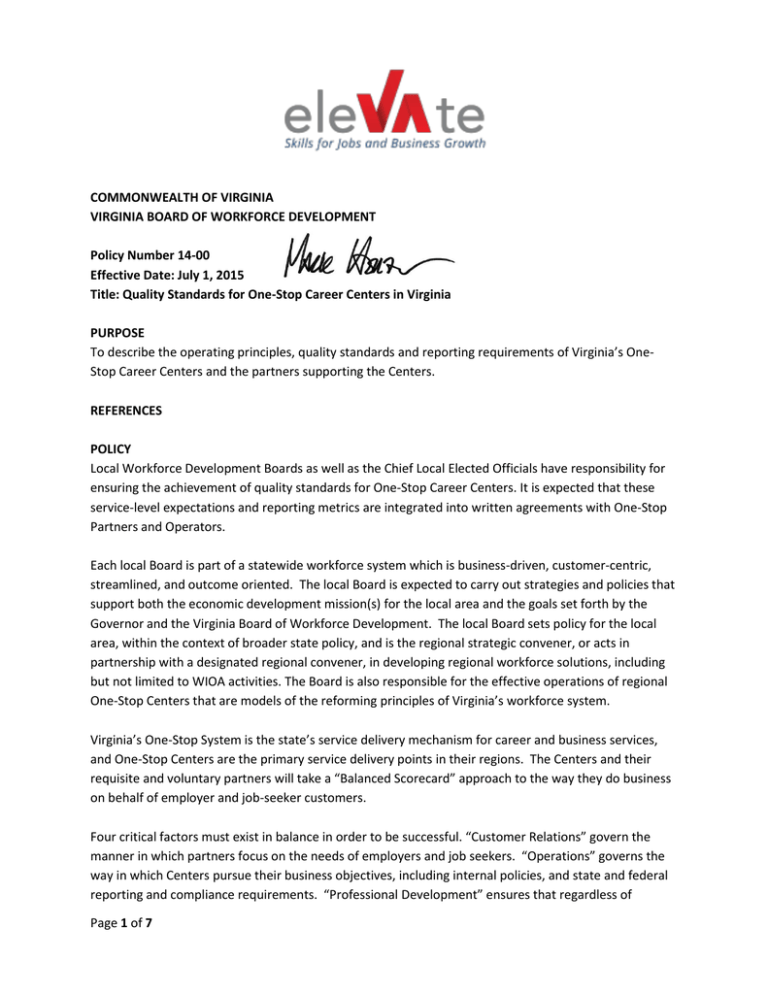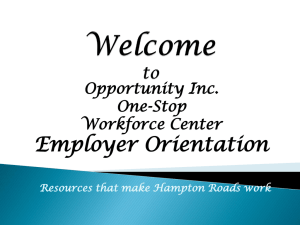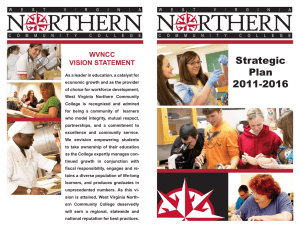14-00 Quality Standards for One-Stop Career
advertisement

COMMONWEALTH OF VIRGINIA VIRGINIA BOARD OF WORKFORCE DEVELOPMENT Policy Number 14-00 Effective Date: July 1, 2015 Title: Quality Standards for One-Stop Career Centers in Virginia PURPOSE To describe the operating principles, quality standards and reporting requirements of Virginia’s OneStop Career Centers and the partners supporting the Centers. REFERENCES POLICY Local Workforce Development Boards as well as the Chief Local Elected Officials have responsibility for ensuring the achievement of quality standards for One-Stop Career Centers. It is expected that these service-level expectations and reporting metrics are integrated into written agreements with One-Stop Partners and Operators. Each local Board is part of a statewide workforce system which is business-driven, customer-centric, streamlined, and outcome oriented. The local Board is expected to carry out strategies and policies that support both the economic development mission(s) for the local area and the goals set forth by the Governor and the Virginia Board of Workforce Development. The local Board sets policy for the local area, within the context of broader state policy, and is the regional strategic convener, or acts in partnership with a designated regional convener, in developing regional workforce solutions, including but not limited to WIOA activities. The Board is also responsible for the effective operations of regional One-Stop Centers that are models of the reforming principles of Virginia’s workforce system. Virginia’s One-Stop System is the state’s service delivery mechanism for career and business services, and One-Stop Centers are the primary service delivery points in their regions. The Centers and their requisite and voluntary partners will take a “Balanced Scorecard” approach to the way they do business on behalf of employer and job-seeker customers. Four critical factors must exist in balance in order to be successful. “Customer Relations” govern the manner in which partners focus on the needs of employers and job seekers. “Operations” governs the way in which Centers pursue their business objectives, including internal policies, and state and federal reporting and compliance requirements. “Professional Development” ensures that regardless of Page 1 of 7 reporting structure staff at every level are properly trained to provide highly professional service to customers. Finally, “Resource Management” focuses on the ways in which staff, material, and fiscal resources are deployed to deliver workforce services effectively and efficiently. Customer Relations Operations Professional Development Resource Management 1. Customer Relations Conceptually, no one element of the “Balanced Scorecard” is more important than another; however, the mission of Virginia’s One-Stop Career Centers begins and ends with Customer Relations. A. No Wrong Door In Virginia’s workforce development system, employers and job seekers, the System’s primary customers, can obtain the services and assistance they need regardless of the venue they choose to enter the system. This includes entry points such as a Virginia Employment Commission program or service, a community college, or a vocational rehabilitation program. In other words, there should be “no wrong door” through which a customer can enter the workforce system; regardless of the program or location through which a customer enters the system, that customer’s service should be exemplary and should connect the customer to multiple, viable sources of assistance that lead to positive outcomes. B. Programmatic Continuum “Career Services” for job seekers are not a menu of separate and unrelated workforce functions. They are programmatic and non-programmatic tools workforce development staff must use in concert to achieve the goal of helping Virginians build careers. One-Stops must streamline their career services to reflect the reality that job seekers may need a diverse range of services that span several programs in order to become or remain competitive in the New Virginia Economy. Similarly, “Business Services” for employers are not a disjointed menu of programs and resources. Building and maintaining relationships with business customers requires an integrated service approach that acknowledges the dynamic and changing nature of employers’ needs, requires an understanding of technological changes affecting specific industries, and Page 2 of 7 appreciation for global and regional market conditions that affect employer demand for workers and skills development in the incumbent and emerging workforce. Business services assumes the absolute necessity of a team based approach—including a broad swath of public and private partners and resources—to delivering the workforce solutions that an industry or industry sector needs to succeed. Business Service strategies are developed by the Local Workforce Development Boards and executed by One-Stop Partners. One-Stop Partners shall respond to requests for business assistance within 48 hours. C. Affirmative Referrals Employer and job seeker customers will be provided with the services they need in a courteous, efficient and timely fashion. In order to improve the customer experience and optimize workflow, One-Stop Partners must establish a practice of “affirmative referrals,” wherein customers needing a variety of services maintain contact with a career service guide or case manager who will expedite their access and passage through an integrated workforce development delivery system. This system of affirmative referrals will ensure quality customer outcomes as individuals or businesses access the resources of the One-Stop System. D. Total Customer Satisfaction In embracing a culture of continuous improvement, One-Stop Partners must actively solicit and respond to feedback from their customers. In that spirit, it is expected that all partners in the One-Stop environment will administer a common customer feedback survey that addresses level of service satisfaction for job seekers and employers. Customer Relations objectives will be achieved by focusing on the specific needs of employers and job seekers through: Execution of effective marketing and communication strategies to increase awareness and utilization of workforce services. Development of effective relationships with systems partners based on trust and mutual respect. The creative use of time, materials, technology, and resources to address customer needs and track and manage customer interactions. Effectively deploying resources to capture, analyze, and respond to feedback from job seekers and employers on their satisfaction with the services they received. 2. Operations Optimizing business processes is a key objective of the One-Stop System in Virginia and it requires a culture of trust and creativity among partners. Further, innovation is a key driver of business success in One-Stop Career Centers because innovation promotes critical thinking, receptivity to new ideas, and continuous improvement. A. Client Intake, Assessment and Screening Page 3 of 7 Each One-Stop Center shall develop a common intake and customer flow process. This customer flow process will be designed to be efficient and effective for the clients. Consideration should be given to streamlining the delivery of career and business services, reducing redundancies and administrative and cost burdens for partners, while delivering the highest quality experience for job seekers and employers. B. Job Placement/Job Fulfillment Two primary and related objectives of the One-Stop System are to assist Virginians to find work using an integrated service approach and to support employers by developing and referring jobready candidates. Partners will collaborate to achieve results for job seekers as well as employer clients. C. Training and Skills Development Many job seekers may not possess appropriate levels of education and training for jobs available today or they may need new skills to meet changing labor market demands. Staff must be able to talk knowledgeably about education and training opportunities available to job seekers and incumbent workers, including skills development that comes through classroom instruction, on line learning, internships, on-the-job training, and apprenticeship opportunities available in partnership with area employers. Above all, One-Stop Partners will employ creativity in their approach to workforce training and skills development while holding students and training partners accountable for outcomes that include the development of marketable job skills and attainment of industry recognized credentials that lead to job placement and retention in jobs that provide a sustaining wage. D. Employer Outreach and Business Services It is an imperative to effectively organize One-Stop Partner resources to address the needs of Virginia’s employers. As a demand-driven system, understanding and responding to employers’ workforce needs is critical to achieving goals. Each One-Stop Center will address in its internal business processes, the implementation of the Local Workforce Development Board’s strategy for employer outreach and business services. This will serve to inform system partners on the types of employers in the local area (public, private, non-profit), as well as prominent industry sectors represented in the local area (agriculture, advanced manufacturing, logistics, tourism, etc.). One-Stop Partners shall develop protocols for working collaboratively and describe the approach they will take to ensure employers are informed of and satisfactorily served by the workforce system. This protocol will include expectations that employer inquiries Operations objectives will be supported by: Utilizing appropriate tools and processes to assess clients’ skills and the marketability and relevance of those skills to employers in the local economy. Providing a comprehensive solution based on the needs identified in the assessment and holding team members accountable for assigned deliverables described in business service proposals. Page 4 of 7 Understanding, interpreting, and collecting local labor market information for the benefit of job seekers and employers. Actively engaging employers to more clearly understand relevant credentials, skills and work experience that position the job seeking client for success. Developing meaningful relationships with qualified training providers and holding those providers accountable to performance standards. Committing to accurate and timely tracking of intake, activities, and outcome data for all customers. 3. Resource Management The concept of a One-Stop Career Center as the comprehensive retail service delivery point for workforce services requires the co-location of agency partners as well as resource sharing. These resources may include talent, time, systems, technology, and money. While many One-Stop Partners are prescribed by WIOA, Workforce Development Boards and One-Stop Partners are encouraged to think creatively in developing additional regional partnerships and resources to provide the most relevant service array accessible through its centers. Resource Management objectives will be achieved by: Establishing a clearly delineated cost sharing model that identifies returns on investment and distributes the fiscal burden for One-Stop operations equitably among the One-Stop Partners. In absence of a local resource sharing agreement, One-Stops will utilize the state infrastructure funding model. 4. Professional Development Staff at all levels must be trained to understand the unique needs of this dual customer system, have knowledge of related partners services and resources to make meaningful referrals, use technology to meet the needs and demands of modern employers and job seekers, AND effectively track system outcomes. This training must be aligned to achieve high customer service standards, execute complex operational elements, and effectively manage resources to realize the system objectives of an effective and efficient One-Stop System that works “at business speed”. Professional Development objectives will be achieved by: Executing a professional development strategy that supports achievement of business objectives, including delivering the highest quality career services to job seekers and effectively serving the workforce needs of the business community. 5. Quality Assurance and Performance Metrics Local Workforce Development Boards are ultimately responsible for ensuring the proper delivery and administration of all workforce services programs in their One-Stop Career Centers. They are to be supported by program managers at the Virginia Employment Commission, the Virginia Community Page 5 of 7 College System, and other agencies who will work collaboratively to ensure that policy is clear and enforced, resources are properly allocated, and problems are resolved in a timely fashion. In alignment with the balanced scorecard approach, each Local Workforce Development Board will forward a quarterly report to the Virginia Board of Workforce Development to include: Customer Service Job seeker customer satisfaction survey results Business customer satisfaction survey results Operations Number of new “participants” (job seeker customers) for the one-stop during the previous quarter Number of hires attributed to the One-Stop Center during the previous quarter Number of training activities completed Number of workforce credentials attained Number of new employers registered in Virginia Workforce Connection (VWC) during the previous quarter Number of new job orders entered into VWC during the previous quarter Number of new job orders matched in VWC during the previous quarter Number of job seekers registered in VWC during the previous quarter Number of employers served by partner staff during the previous quarter (An employer “served” is one who had a defined workforce need and received a solution developed by one or more One-Stop Partners.) Resource Management Narrative which describes adherence to the Resource Management Plan arrangement Professional Development List of professional development activities completed Number of frontline staff trained and certified in compliance with State policy Page 6 of 7 6. Technical Assistance The Virginia Community College System will provide technical assistance through a dedicated One-Stop System Support Team, which will be comprised of subject matter experts from partnering agencies along with dedicated WIOA program staff. This team will be selected from among agency and LWDB staffs. A. Mechanisms for Dealing with Conflicting Policy Local Workforce Development Boards, through their staff, will immediately alert policy staff at the Virginia Community College System of any situation for which there is a conflict between partner agencies. The VCCS, in turn, will provide regular reports to the staff of the Virginia Board of Workforce Development and the Governor’s Chief Workforce Advisor of recurring problems and unresolved issues. Conflicts will be resolved, by the Governor’s Office as necessary, with the best interests of the workforce system’s customers in mind. Page 7 of 7


